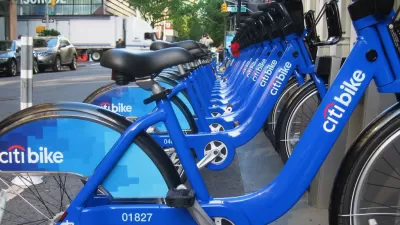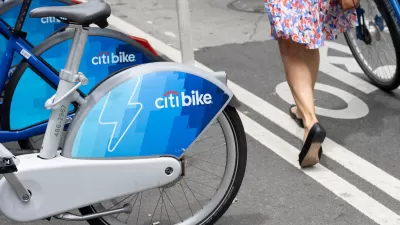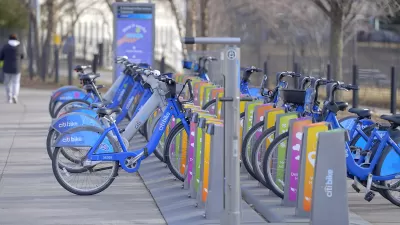Since it appeared online over the weekend, a humorously odd 5-minute diatribe by Wall Street Journal editorial board member Dorothy Rabinowitz has spread like wildfire. J.K. Trotter considers the possible sources of her anti-bicycle vitriol.

As we've noted previously, the launch of New York City's new bike share program has elicited fierce reaction (both in support and opposition). But a recent interview with Wall Street Journal editorial board member Dorothy Rabinowitz that was posted online over the weekend set a new standard for vitriol. "Ever since," writes Trotter, "[Rabinowitz has] become the most blogged-about nemesis of the already controversial bike-share, with media critics, liberal opinionators, and regular old bike-riders jumping on her comments about transportation '"totalitarians.'" The speed with which her fury has spread must certainly be the envy of similarly opinionated commenters from New York to Los Angeles.
Trotter opines on Rabinowitz's impetus, and the seemingly erroneous motivations ascribed to her.
"So why does Rabinowitz dislike CitiBikes so much?" concludes Trotter. "This is perhaps the only question that Rabinowitz does not truly answer, instead intimating that all bicyclists — instead of cab drivers — intentionally threaten the wellbeing of Manhattanites, if not their actual lives, by swerving in and out of traffic and terrorizing the city's sidewalks. (Her other complaints concern CitiBike's color scheme, kiosk placement, and the debunked myth that its bike racks impede the work of emergency personnel.) Which is to say that, like basically all the other backlash directed at CitiBike, the issue here concerns bikes and their place in a city's transportation ecosystem, not the manner in which they are rented or shared."
FULL STORY: Why the Wall Street Journal Hates Bikes So Much

Planetizen Federal Action Tracker
A weekly monitor of how Trump’s orders and actions are impacting planners and planning in America.

Chicago’s Ghost Rails
Just beneath the surface of the modern city lie the remnants of its expansive early 20th-century streetcar system.

San Antonio and Austin are Fusing Into one Massive Megaregion
The region spanning the two central Texas cities is growing fast, posing challenges for local infrastructure and water supplies.

Since Zion's Shuttles Went Electric “The Smog is Gone”
Visitors to Zion National Park can enjoy the canyon via the nation’s first fully electric park shuttle system.

Trump Distributing DOT Safety Funds at 1/10 Rate of Biden
Funds for Safe Streets and other transportation safety and equity programs are being held up by administrative reviews and conflicts with the Trump administration’s priorities.

German Cities Subsidize Taxis for Women Amid Wave of Violence
Free or low-cost taxi rides can help women navigate cities more safely, but critics say the programs don't address the root causes of violence against women.
Urban Design for Planners 1: Software Tools
This six-course series explores essential urban design concepts using open source software and equips planners with the tools they need to participate fully in the urban design process.
Planning for Universal Design
Learn the tools for implementing Universal Design in planning regulations.
planning NEXT
Appalachian Highlands Housing Partners
Mpact (founded as Rail~Volution)
City of Camden Redevelopment Agency
City of Astoria
City of Portland
City of Laramie





























